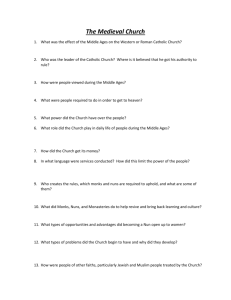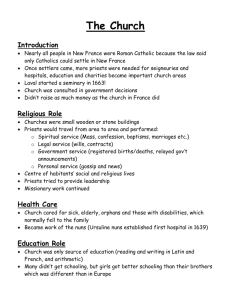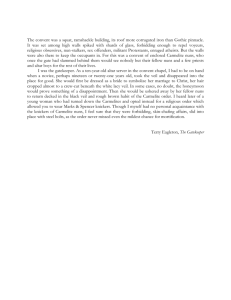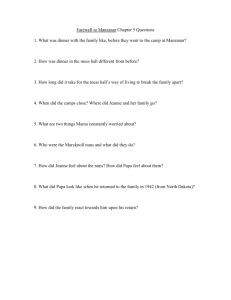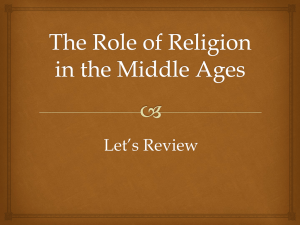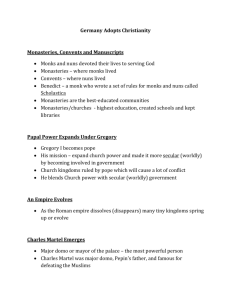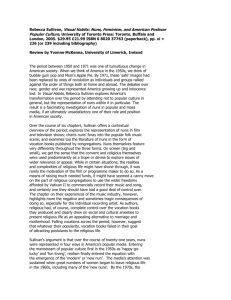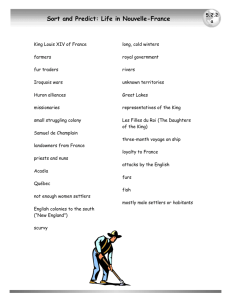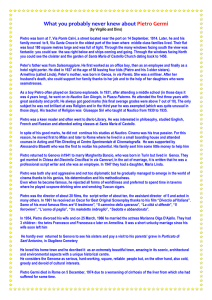from Lives of Nuns
advertisement
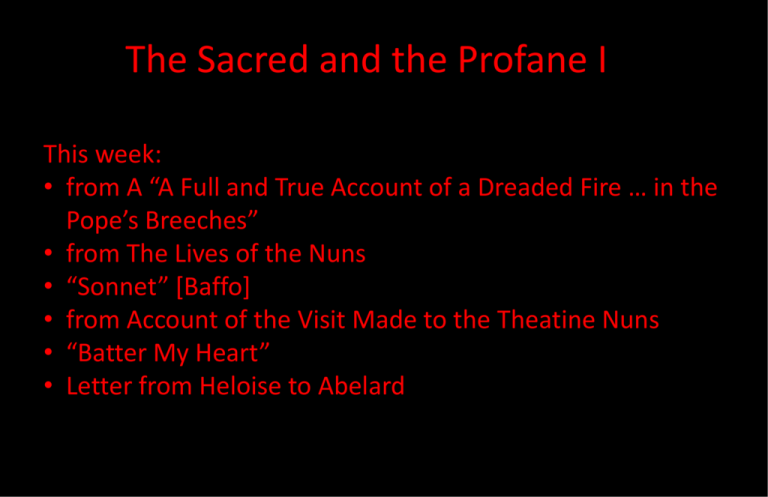
The Sacred and the Profane I This week: • from A “A Full and True Account of a Dreaded Fire … in the Pope’s Breeches” • from The Lives of the Nuns • “Sonnet” [Baffo] • from Account of the Visit Made to the Theatine Nuns • “Batter My Heart” • Letter from Heloise to Abelard The Sacred and the Profane I The Sacred and the Profane I Sexy librarian The Sacred and the Profane I Sexy priest The Sacred and the Profane I Sexy priest The Sacred and the Profane I The Sacred and the Profane I beatitude = orgasm purity/impurity Religion and sex power pleasure/desire transgression guilt/forgiveness righteousness/sin material/spirit From A Full and True Account of a Dreaded Fire, that Lately Broke out in the Pope’s Breeches • anonymous poem 1713 • some powerful anti-Catholic feeling in England • Queen Anne in power (Protestant) • her father had converted to Catholic • Catholics viewed as • debauched, licentious, extravagant, and sex-crazed • satanic • associated with magic, tricks, opulence Pope Clement XI From A Full and True Account of a Dreaded Fire, that Lately Broke out in the Pope’s Breeches • So: • • • • • • • there’s a lot of complicated stuff sacred/profane spiritual/material (body) denial/indulgence reward/punishment the location of PLEASURE pleasure of inversion, misdirection, substitution, deception • the Pope’s actions are apparently natural (male-female) but then unnatural (anal) and then punished Pope Clement XI From A Full and True Account of a Dreaded Fire, that Lately Broke out in the Pope’s Breeches • all of which raises the question: • where is the reader’s pleasure in all this? • is it condoned? • natural? • moral? • righteous? Pope Clement XI from Lives of Nuns (Pietro Aretino) 1527 • Aretino is “the inventor of pornography” • from Arezzo in Italy; died in Venice (which, as we discussed, was SINful) • the Pope was one of his patrons – for a while • specialised in the profane, obscene • Chief works: • Lives of Nuns • Lives of Wives • The School of Whoredom • he seems to have especially liked to satirize the rich and powerful – risky behaviour • irreverent and outrageous • so, let’s get down to it from Lives of Nuns (Pietro Aretino) 1527 • so this is an orgy • set in an Abbey – like a monastery, but with both nuns and monks • begins in a black mass – not exactly • but a travesty, a parody, a profanation • first – clothes changing • second – positioning • third – conclusion • fourth – denouement – enacts the reader’s activity • toys! | anal! | Pater Noster from Lives of Nuns (Pietro Aretino) 1527 • I nearly lost my voice yesterday from Lives of Nuns (Pietro Aretino) 1527 • I nearly lost my voice yesterday • so today: from Lives of Nuns (Pietro Aretino) 1527 • I nearly lost my voice yesterday • so today: • I’ll put up the slides and YOU will tell me about them. from Lives of Nuns (Pietro Aretino) 1527 • I nearly lost my voice yesterday • so today: • I’ll put up the slides and YOU will tell me about them. • Get into groups of 4 or 5 from Lives of Nuns (Pietro Aretino) 1527 • I nearly lost my voice yesterday • so today: • I’ll put up the slides and YOU will tell ME about them. • Get into groups of 4 or 5 • Do it NOW. from Lives of Nuns (Pietro Aretino) 1527 Here are some of the key elements you’ll want me to be aware of: from Lives of Nuns (Pietro Aretino) 1527 Here are some of the key elements you’ll want me to be aware of: • clothing/dress – WHY? from Lives of Nuns (Pietro Aretino) 1527 Here are some of the key elements you’ll want me to be aware of: • clothing/dress – WHY? • pain/suffering = ecstasy (at least in outward appearance) – WHY? from Lives of Nuns (Pietro Aretino) 1527 Here are some of the key elements you’ll want me to be aware of: • clothing/dress – WHY? • pain/suffering = ecstasy (at least in outward appearance) – WHY? • the “clyster” from Lives of Nuns (Pietro Aretino) 1527 Here are some of the key elements you’ll want me to be aware of: • clothing/dress – WHY? • pain/suffering = ecstasy (at least in outward appearance) – WHY? • the “clyster” • what is it? from Lives of Nuns (Pietro Aretino) 1527 Here are some of the key elements you’ll want me to be aware of: • clothing/dress – WHY? • pain/suffering = ecstasy (at least in outward appearance) – WHY? • the “clyster” • what is it? • WHY? from Lives of Nuns (Pietro Aretino) 1527 Here are some of the key elements you’ll want me to be aware of: • clothing/dress – WHY? • pain/suffering = ecstasy (at least in outward appearance) – WHY? • the “clyster” • what is it? • WHY? • bottom p. 28 to end from Lives of Nuns (Pietro Aretino) 1527 Here are some of the key elements you’ll want me to be aware of: • clothing/dress – WHY? • pain/suffering = ecstasy (at least in outward appearance) – WHY? • the “clyster” • what is it? • WHY? • bottom p. 28 to end • in tentationem, et libera nos a malo -- ??? from Lives of Nuns (Pietro Aretino) 1527 Here are some of the key elements you’ll want me to be aware of: • clothing/dress – WHY? • pain/suffering = ecstasy (at least in outward appearance) – WHY? • the “clyster” • what is it? • WHY? • bottom p. 28 to end • in tentationem, et libera nos a malo -- ??? from Lives of Nuns (Pietro Aretino) 1527 Our Father who art in Heaven, Hallowed be thy name; Thy kingdom come Thy will be done On earth as it is in heaven. Give us this day our daily bread; And forgive us our trespasses As we forgive those who trespass against us; And lead us not into temptation, But deliver us from evil. from Lives of Nuns (Pietro Aretino) 1527 Our Father who art in Heaven, Hallowed be thy name; Thy kingdom come Thy will be done On earth as it is in heaven. Give us this day our daily bread; And forgive us our trespasses As we forgive those who trespass against us; And lead us not into temptation, But deliver us from evil. • the will of the flesh • my nature beastly • to mortify my lust • martyrdom and enjoyment • dying a milder death • I behold it gory and am about to cry: Confession! From “Account of the Visit Made to the Theatine Nuns, …” • • • • • • • • Benedetta Carlini (c. 1619) power, confession, interrogation, torture, pleasure, pain, suffering, knowledge, truth “ecclesiastical interrogations” – what are those? power produces the acts it governs exercise of power here but also enjoyment minute detailing of events interest in number of times, how, when, where, etc. a record for a spiritual court but dealing with the body and bodily acts Benedetta Carlini (c. 1619) • • • • • • • • Carlini was from a fairly wealthy family got her a nice spot in a convent – lucky! she becomes Abbess but gets locked in her cell because hallucinations lover of another nun, Sister Bartolomea they would frolic, then have visions sex = transcendence | sex = illusion, despair, damnation who can tell? Suddenly: Sonnets! • • • • • • • 14 line poem with regular rhyme love poetry primarily very structured and formal primarily used at court for showing off Petrarchan sonnet -- his love for Laura Shakespearean sonnet -- his love for the “dark lady” Spenserian sonnet -- his love for God AESTHETICS | FORM | CONTROL | TENSION | RESOLUTION | PLEASURE Giorgio Baffo 1694-1768 • • • • born and wrote in Venice licentious Italians, amirite? Sonnetti Erotici belongs on the playful, celebratory, joyful side of thinking about the erotic • sees it as fun, laughter-filled, humourous • earthy, and rejects the dour asceticism of religious prohibition • argues that it stands to reason that if humans are made in God’s image, and we have sexuality, then God must too; and that if sex is fun on earth – maybe the best thing going – then it must also be in heaven Giorgio Baffo 1694-1768 • sonnet – fits the form mostly (no rhyme, but we are in translation here) • sonnets set problems and solve them • here in octave we get the problem: how can heaven be good if there’s no sex? • in sestet we get solution: there is sex and God has it everytime anyone has it • fairly radical rejection of asceticism (ἄσκησις áskēsis) • at issue is who owns pleasure and what its moral status is John Donne 1572-1631 • “Batter My Heart” is NOT a cannibal recipe • • • • • • • • poet, essayist, theologian cleric in Anglican Church we already read his “The Flea,” remember? became a priest against his will (King James I ordered it) appointed dean of St. Paul’s Cathedral in London also celebrant of human sexuality and desire reckoned on continuity of the human and the divine contemporary of Shakespeare personal relationship with God, access to the divine through the everyday • there is no necessary tension between the sacred and the profane • unlike Baffo, he comes at this from the perspective of divinity – sex is part of the divine not in a bathetic sense, but in an elevating sense John Donne 1572-1631 Power | Desire | Pleasure | Ecstasy the body as a medium of access to the soul the parallel of being ravished to infusion of holy spirit the paradox of rising up by sinking low paradox itself as an intellectual ecstasy the pleasure of the intellect, aesthetics, language, form, contradiction and tension in the name of a higher unity where body and soul coincide in perfect enjoyment Heloise’s letter to Abelard • their story: • lovers in youth • Heloise gets pregnant • won’t marry Abelard • her uncle castrates Abelard in revenge • OWCH • she enters convent • they write to each other • possibly the greatest epistolary love affair of all time • the stuff of legend up there with Romeo and Juliet, Tristan and Isolde Heloise’s letter to Abelard • this letter: • female sexuality • fantasy • profanation • purity – God or love? Is God love? • eros of the interior life – what are you thinking? • RIGHT NOW?!? Heloise’s letter to Abelard • but also the tremendous erotic power of words • knowledge, writing, instruction and learning • Abelard was her tutor • their erotic lives are sparked by learning • replays the biblical story • but in new context and with different moral • knowledge is hot; knowing is sexy • (sexy librarian, schoolteacher, nurse, doctor, scientist…) Others? Song of Solomon (Bible) Song of Songs (Heine) Next week Story of the Eye And the mid-term…
